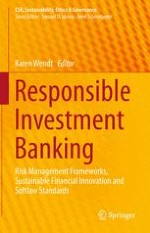2015 | OriginalPaper | Buchkapitel
Are the Equator Principles Greenwash or Game Changers? Effectiveness, Transparency and Future Challenges
verfasst von : Ariel Meyerstein
Erschienen in: Responsible Investment Banking
Aktivieren Sie unsere intelligente Suche, um passende Fachinhalte oder Patente zu finden.
Wählen Sie Textabschnitte aus um mit Künstlicher Intelligenz passenden Patente zu finden. powered by
Markieren Sie Textabschnitte, um KI-gestützt weitere passende Inhalte zu finden. powered by
